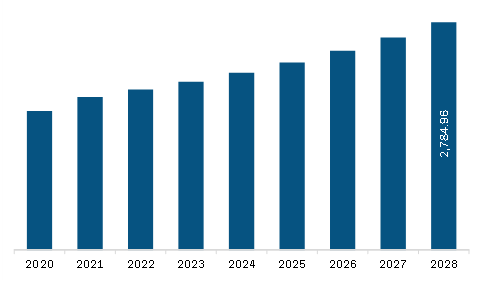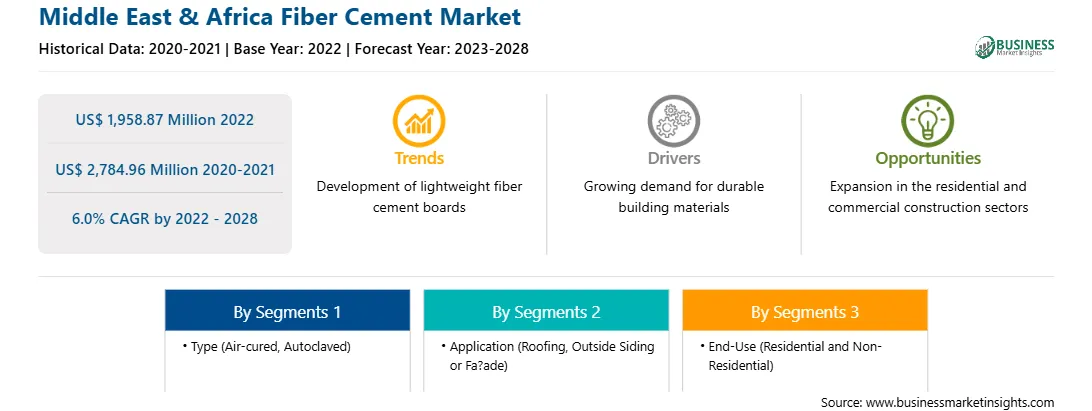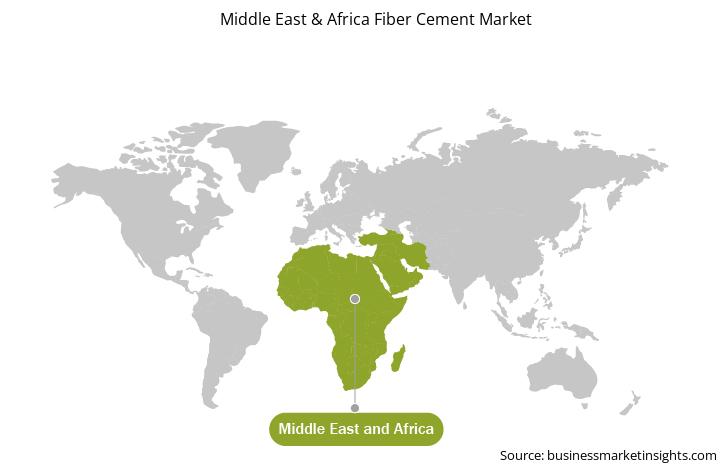The building construction industry is increasingly focusing on encouraging developments of sustainable construction for a healthy and environmentally friendly living. Regular cement requires different raw materials, including water, during production, while fiber cement relies on recycled materials and consumes fewer resources. With water crises in certain areas worldwide, using materials that reduce water usage is necessary. Further, fiber cement products are not made of natural materials but have several advantages over renewable resources like wood. Rapid deforestation is a major environmental concern, so wood construction materials can fuel unsustainable forestry practices. As fiber cement siding lasts longer, they are preferable to wood siding and others that need to be replaced often. The higher replacement of siding results in high waste accumulation in local landfills. Fiber cement products do not use fossil fuels to produce vinyl construction material. Thus, due to an increasing preference for sustainability and a focus on eco-friendly building materials, there will be an increase in the development of eco-friendly fiber cement in the coming year.
The growing demand among real estate developers and the surge in infrastructural projects owing to industrialization and urbanization in the region are the key factors anticipated to drive the fiber cement market growth. The rising urban population has improved the construction of private residential buildings from semi-urban and urban cities. The government is looking forward to investing large amounts in the building and construction industry. The growing need for residential and non-residential buildings in the region has created lucrative opportunities for the fiber cement market in the Middle East and Africa. The increasing adoption of innovative eco-friendly materials in construction coupled government initiatives for developing smart building in the region will drive market revenue growth during the forecast period. In addition, rapid technological advancements in infrastructure development with improving economic conditions, have resulted in rising disposable income among consumers. Increasing investment in offices, malls, colleges, schools, universities, and hospitals in the region with the expansion of the hotel business is expected to support the regional revenue growth during the forecast period.
Strategic insights for the Middle East & Africa Fiber Cement provides data-driven analysis of the industry landscape, including current trends, key players, and regional nuances. These insights offer actionable recommendations, enabling readers to differentiate themselves from competitors by identifying untapped segments or developing unique value propositions. Leveraging data analytics, these insights help industry players anticipate the market shifts, whether investors, manufacturers, or other stakeholders. A future-oriented perspective is essential, helping stakeholders anticipate market shifts and position themselves for long-term success in this dynamic region. Ultimately, effective strategic insights empower readers to make informed decisions that drive profitability and achieve their business objectives within the market. The geographic scope of the Middle East & Africa Fiber Cement refers to the specific areas in which a business operates and competes. Understanding local distinctions, such as diverse consumer preferences (e.g., demand for specific plug types or battery backup durations), varying economic conditions, and regulatory environments, is crucial for tailoring strategies to specific markets. Businesses can expand their reach by identifying underserved areas or adapting their offerings to meet local demands. A clear market focus allows for more effective resource allocation, targeted marketing campaigns, and better positioning against local competitors, ultimately driving growth in those targeted areas.
Middle East & Africa Fiber Cement Strategic Insights

Middle East & Africa Fiber Cement Report Scope
Report Attribute
Details
Market size in 2022
US$ 1,958.87 Million
Market Size by 2028
US$ 2,784.96 Million
Global CAGR (2022 - 2028)
6.0%
Historical Data
2020-2021
Forecast period
2023-2028
Segments Covered
By Type
By Application
By End-Use
Regions and Countries Covered
Middle East and Africa
Market leaders and key company profiles
Middle East & Africa Fiber Cement Regional Insights

Middle East & Africa Fiber Cement Market Segmentation
The Middle East & Africa fiber cement market is segmented into type, application, end-use, and country.
Based on type, the Middle East & Africa fiber cement market is segmented into air-cured and autoclaved. The autoclaved segment held a larger share of the Middle East & Africa fiber cement market in 2022.
Based on application, the Middle East & Africa fiber cement market is segmented into roofing, outside siding or façade, and others. The roofing segment held the largest share of the Middle East & Africa fiber cement market in 2022.
Based on end- use, the Middle East & Africa fiber cement market is segmented into residential and non-residential. The non-residential segment held a larger share of the Middle East & Africa fiber cement market in 2022.
Based on country, the Middle East & Africa fiber cement market is segmented into South Africa, Saudi Arabia, the UAE, and the Rest of Middle East & Africa. The Rest of Middle East & Africa dominated the share of the Middle East & Africa fiber cement market in 2022.
Compagnie de Saint Gobain SA; Etex NV; Isam Khairi Kabbani Group; and Swisspearl Group AG are the leading companies operating in the Middle East & Africa fiber cement market.
The Middle East & Africa Fiber Cement Market is valued at US$ 1,958.87 Million in 2022, it is projected to reach US$ 2,784.96 Million by 2028.
As per our report Middle East & Africa Fiber Cement Market, the market size is valued at US$ 1,958.87 Million in 2022, projecting it to reach US$ 2,784.96 Million by 2028. This translates to a CAGR of approximately 6.0% during the forecast period.
The Middle East & Africa Fiber Cement Market report typically cover these key segments-
The historic period, base year, and forecast period can vary slightly depending on the specific market research report. However, for the Middle East & Africa Fiber Cement Market report:
The Middle East & Africa Fiber Cement Market is populated by several key players, each contributing to its growth and innovation. Some of the major players include:
The Middle East & Africa Fiber Cement Market report is valuable for diverse stakeholders, including:
Essentially, anyone involved in or considering involvement in the Middle East & Africa Fiber Cement Market value chain can benefit from the information contained in a comprehensive market report.